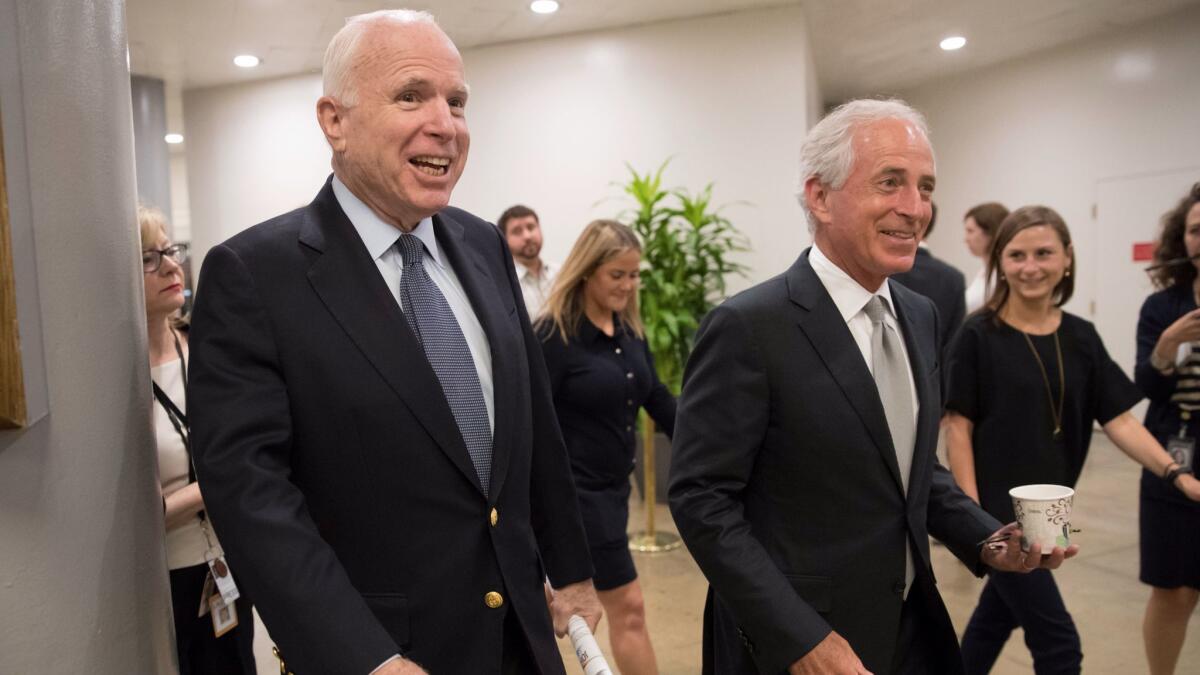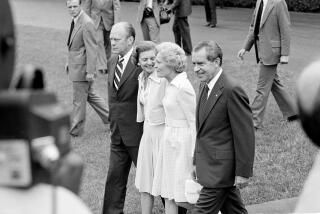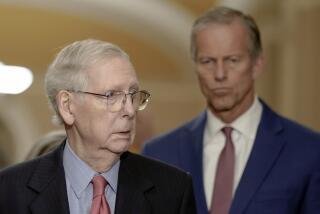Op-Ed: The Never Trump establishment still hasn’t reckoned with its policy mistakes

When Sen. Bob Corker first proposed sending lethal U.S. weaponry to Kiev so that Ukrainians could fight off their nuclear-armed Russian neighbors, no one then warned that the Tennessee Republican’s ideas could hurtle us “toward World War III.”
When Corker came within an eyelash of persuading then-President Obama in August 2013 to bomb Syria, “get Assad” and provide aid to “the moderate, vetted opposition,” nobody said that the future Senate Foreign Relations Committee chair should “concern anyone who cares about our nation.”
Now Corker’s enjoying Strange New Respect from the media after plausibly calling President Trump a reckless, lying manchild. Everyone’s cheering on the brave if late-breaking Trump-apostasy from a yet another high-profile Republican — whose own interventionist policies will go safely ignored.
Conservative NeverTrumpers — or should we call them the Unfitters since the man’s in office?— may be broadly correct about the president’s erratic temperament, shoddy management and aggressive incoherence on the world stage. But too many lack any sense of self-awareness, let alone regret, about how their foreign policy preferences have contributed to the global instability Trump is exacerbating.
For decades there has been a default Washington posture of aggressive meddling into the whole world’s affairs.
Take the president’s biggest antagonist in both Congress and on the Sunday chat shows, Sen. John McCain. The re-beloved maverick, back in his most crowd-pleasing role as the GOP’s in-house scold, is right to point out that Trump’s rhetorical bluster toward North Korea could have deadly consequences. “They have 1,000 rockets aimed at Seoul that could set that city on fire,” he said in August.
But McCain has been blustering toward Pyongyang for more than two decades, arguably creating a political promise of action that only Trump seems reckless enough to take seriously. As far back as 1994, the Arizona senator warned that if China and Japan don’t do more to help forestall their neighbor’s nuclear ambitions, “then the United States will have no choice but to militarily disable that nuclear capability.”
And if that leads to war? McCain was asked then by ABC’s Sam Donaldson. (That’s how long ago this was.) “I know what they understand, and that is the threat of extinction.” (The “SAD!” was implied.)
This was no mere gaffe. McCain advocated “rogue state rollback” for North Korea in a 2003 article under that headline, and in fact is so fond of that phrase he made it the name of his 2000 campaign foreign policy doctrine, which sought “to overthrow the odious regimes that rule” such countries as “Iraq, North Korea and others.” He was for preemptive war years before even George W. Bush
There has been no serious Pentagon war-gaming of a Korean peninsula conflict during the past quarter of a century that didn’t involve Pyongyang setting Seoul “on fire.” And yet that hasn’t prevented generations of Republicans, including many of Trump’s most vociferous critics, from breezily advocating military blockades, preemptive strikes and/or regime change.
In February 2016, just after news broke of another North Korea missile test, GOP presidential hopefuls were grilled by moderator Martha Raddatz about how ready they were to confront Kim Jong Un militarily. “The next president of the United States is going to have to get the United States back in the game,” Jeb Bush responded flippantly, “and if a preemptive strike is necessary to keep us safe, then we should do it.”
But the most aggressive set of policies came from Trump’s likeliest primary challenger in 2020, Ohio Gov. John Kasich. “We have to make sure that we intercept both the ships and their aircraft,” he said, as if such acts of war were no big thing. “Regime change” then became part of Kasich’s stump speech.
At a subsequent debate, when asked by CNN’s Wolf Blitzer if he really meant that phrase, given that “Kim Jong Un would use a weapon of mass destruction if he thought his regime was being threatened,” Kasich issued this positively Trumpian clarification: “When you talk about regime change, Wolf, it means regime change. That’s what it means.”
And North Korea was not the only place where candidate Kasich meant it. He recommended the removal of Bashar Assad, a possible preemptive strike against Iran, plus a major land war against the militant group Islamic State (“We have to go massively, like we did in the first Gulf War”). Ask yourself this: Who is treated more like a bloodthirsty lunatic, Kasich or Trump?
The anti-Trump interventionists may be right about the unique dangers this president poses, not just through his chaotic foreign policy but also his retrograde 19th century ideas about trade and immigration. But for decades there has been a default Washington posture of aggressive meddling into the whole world’s affairs, and downright belligerence toward many rogue states. Trump won’t be around forever, but until that foreign policy tradition is confronted and questioned anew, the dangers he poses will live on.
Matt Welch is editor at large of Reason, a magazine published by the libertarian Reason Foundation, and a contributing writer to Opinion.
Follow the Opinion section on Twitter @latimesopinion or Facebook
More to Read
A cure for the common opinion
Get thought-provoking perspectives with our weekly newsletter.
You may occasionally receive promotional content from the Los Angeles Times.






